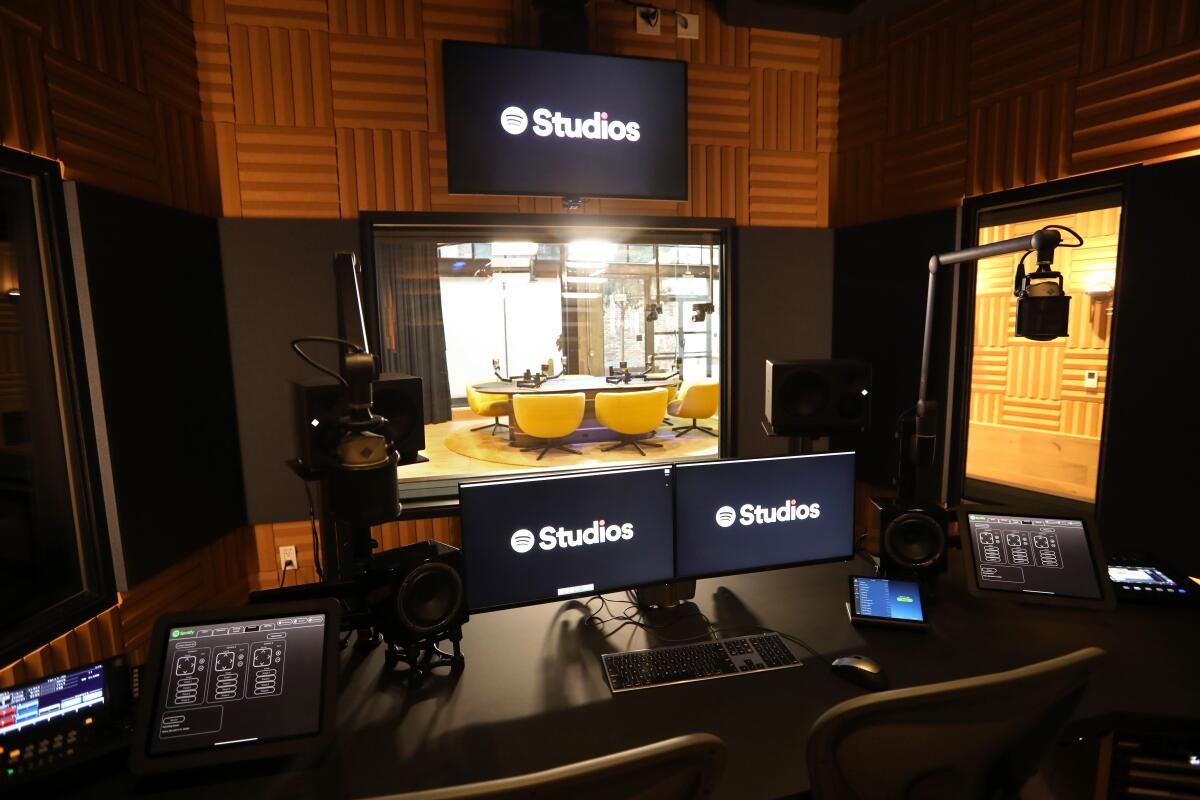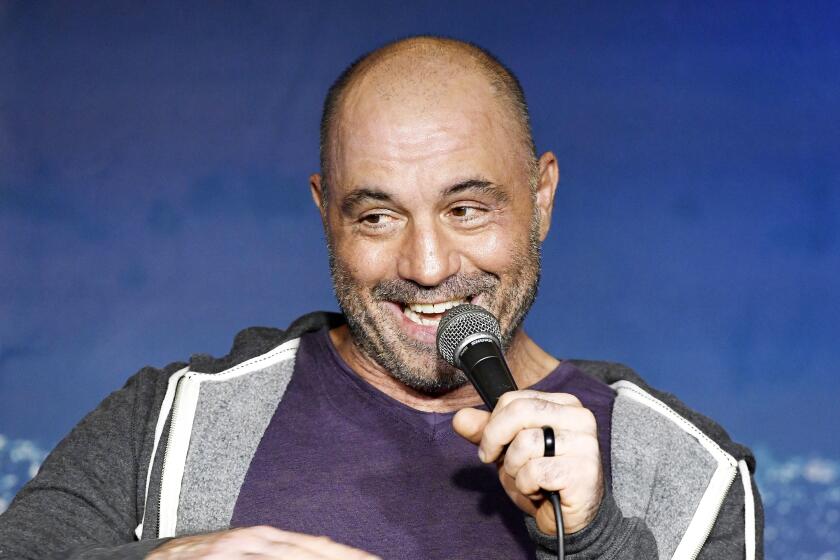News Analysis: Spotify’s biggest problem isn’t Joe Rogan. It’s ambition

- Share via
The source of streaming giant Spotify’s latest corporate headaches began quietly, about a month ago, on TikTok.
A small community of scientists, doctors and others who post educational content on TikTok and other social media platforms began messaging one another with concerns about a Dec. 30 podcast where Spotify’s most popular host, Joe Rogan, uncritically interviewed a controversial COVID-19 vaccine critic.
A misinformation researcher in the group, Abbie Richards, noted something unusual: Spotify, unlike TikTok and many other platforms, did not have a public-facing “misinformation” policy to restrict potentially harmful content about the pandemic. The group crafted an open letter that demanded one.
So far, the response to Neil Young’s call to pull music from Spotify has been largely muted among recording artists.
“We did not ask for Joe Rogan’s episode to be removed or for Joe Rogan to be de-platformed. That was very intentional,” said Ben Rein, a neuroscientist and postdoctoral fellow at Stanford, who co-authored the open letter, which was initially signed by more than 250 medical professionals, scientists and others. “These platforms have a responsibility to invest in developing effective approaches to combat misinformation.”
The letter triggered a month of drama for Spotify that continues, with boycotts by artists like Neil Young and Joni Mitchell, cries of censorship by Rogan’s supporters and stormy internal debates among Spotify employees even after the company revealed its internal content-moderation guidelines and promised new labeling on pandemic-related podcasts.
Amid this furor, Rogan has remained the towering central figure who seemingly everyone loves — or hates — to argue about. After striking a deal said to be worth roughly $100 million to make his show exclusive to Spotify in 2020, “The Joe Rogan Experience” has become Spotify’s most popular podcast in 93 markets.
He sometimes hosts controversial (and often right-wing) figures, but can boast many fans and defenders across the ideological and cultural spectrum, including liberal host Jon Stewart and controversy-averse actor Dwayne Johnson.
Rogan also has many passionate detractors, and the liberal watchdog Media Matters employs a researcher who has listened to hundreds of hours of his shows to document the most controversial portions. (Rogan did not respond to a request for comment.)
“I’m trying to highlight that he regularly and without consequence veers into harmful lies about our response to the current pandemic,” among other issues, said Alex Paterson, senior researcher at Media Matters. “So at one moment he may be discussing elk hunting or MMA fighting, then suddenly he’ll push the right-wing lie that [President] Biden is trying to stop the public from accessing monoclonal antibodies.”
But what’s become increasingly clear in recent weeks is that the source of Spotify’s headaches isn’t Rogan. It is Spotify’s own corporate ambition to dominate the audio business — and keep investors happy — by reaching 1 billion users and 50 million “creators.”
During a Wednesday town hall, some Spotify employees wrangled with executives over management’s persistence in defining Spotify as a platform rather than a publisher, a dichotomy the company has awkwardly straddled by becoming the exclusive distributor of Rogan’s show while agreeing not to editorially supervise it, apart from removing episodes that might violate generic company content guidelines.
Addressing employees, Spotify CEO Daniel Ek‘s remarks suggested that he wasn’t particularly personally fond of Rogan’s show.
“There are many things that Joe Rogan says that I strongly disagree with and find very offensive,” Ek told employees, according to audio obtained by the Verge.
But as Ek told it, the exclusive deal with Rogan and others gave the platform a key lift.
“In 2019, our music and podcasting catalog was not that differentiated, and because of this we were locked out of deals with some critical hardware partners like Amazon, Google, and even Tesla,” Ek said. “They had or were working to build their own streaming services with essentially the same content, so there was really no reason for them to integrate our service.”
Apple, for example, a peer in both the music and podcasting space, can offer discounts on subscriptions to its services or longer free trials because it makes the majority of its revenue through selling iPhones. And unlike Google, Spotify does not make its own phones or provide the operating system to phones, meaning that it would need to partner with those companies, many who have their own competing streaming services.
Then there’s Amazon, which is a logistics and web services behemoth that also happens to be a music streaming and entertainment company on the side.
“What all these other companies also have in common is that they can afford to lose money on music, because it’s not their entire business — far from it,” said Tatiana Cirisano, music industry analyst and consultant with MIDiA Research. “For Spotify, at least until podcasting, music has been its entire business.”
So in Ek’s telling, to make itself stick out from its competitors and get to the ears of Tesla drivers and other consumers, Spotify needed to stop acting like a blank-space platform and offer something interesting.
It needed something exclusive its rivals didn’t — or couldn’t — have. Something, or someone, like Rogan, as well as several other podcast production companies that the company has acquired in recent years, becoming a wildly successful player in the audio space in just a short period of time.
As a result of those moves, “we’re the number one podcasting platform U.S. listeners use the most,” Ek told employees this week. “So to be frank, had we not made some of the choices we did, I am confident that our business wouldn’t be where it is today.”
Ek’s approach to editorial content, even Rogan’s, was striking to some Spotify employees, some of whom have told management that the company’s association with Rogan-related controversies was straining their own reputations as well as the company’s.
“Ek was pretty transparent about Rogan being a means to an end,” said one employee, who was not authorized to speak to the media.
Of the drama, another Spotify employee added: “The more the company expands, the more potential it has to confront thorny moral dilemmas. Spotify didn’t have these problems before it decided to enter and dominate the podcast space.”
Spotify did not respond to a request for comment.
Many ambitious tech companies have faced the growing pains of unhappy employees with ethics concerns (Facebook and its whistleblowers, as one example), content-moderation controversies (Twitter’s ban on President Trump), and controversial commentary by high-leverage stars (Netflix and Dave Chappelle).
Spotify is facing all three scenarios at once, and unlike other companies, Spotify’s latest controversy over its content-moderation policies was boosted and accelerated thanks in part to the grudges already held by its longtime music community.
It was musicians’ catalogs that first made Spotify indispensable to listeners, and which in turn made Spotify an unavoidable and oft-loathed corporate tollbooth for artists seeking to connect with audiences and get visibility after the analog record business collapsed.
“Artists have hated this company for a long time,” said Joey DeFrancesco, a member of the bands Downtown Boys and La Neve, who is an organizer with the Union of Musicians and Allied Workers, which has pressured Spotify and other streamers to raise paltry streaming royalty payments to artists. “The whole industry has been sucked into streaming, and we’re making nothing off it.”
The medical professionals and others’ open letter to Spotify was initially ignored by the company, until longtime activist musician Neil Young boosted their cause by demanding his music be removed. On his website, he said it was over “misinformation and lies about COVID,” but then added his longtime criticism that “SPOTIFY continues to peddle the lowest quality in music reproduction.”
Singer India Arie withdrew her own music and podcast from Spotify over concerns about Rogan’s commentary about race, and then added: “paying musicians a Fraction of a penny? and HIM $100M? This shows the type of company they are and the company that they keep.”
But most artists haven’t left the service, and app analytics data indicates that, so far, Spotify has not seen a significant drop off in new sign ups after the boycotts. In a poll conducted by Forrester Research on Feb. 1, 40 out of the 211 Spotify users said they canceled or are planning to cancel their subscriptions, although people often don’t follow through on such plans.
Investors seemed mollified after Ek announced that Spotify was publishing its content-moderation policy among other measures. Rogan, in an Instagram video, appeared contrite and said he might try to have on more mainstream guests that balance out his more controversial interviews.
“I feel like most people at the end of the day would agree that the steps that Rogan and Spotify announced are pretty reasonable,” said Jeffrey Wlodarczak, a principal and entertainment/interactive subscription services analyst at Pivotal Research Group.
Otherwise, the message from Ek has been that Spotify will stay the course.
“Ultimately, this really comes down to two things,” Ek told employees. “First, do we believe in our mission: 50 million creators and 1 billion users? And finally, are we willing to consistently enforce our policies on even the loudest and most popular voices on the platform? I’m telling you, I believe both.”
More to Read
The biggest entertainment stories
Get our big stories about Hollywood, film, television, music, arts, culture and more right in your inbox as soon as they publish.
You may occasionally receive promotional content from the Los Angeles Times.













